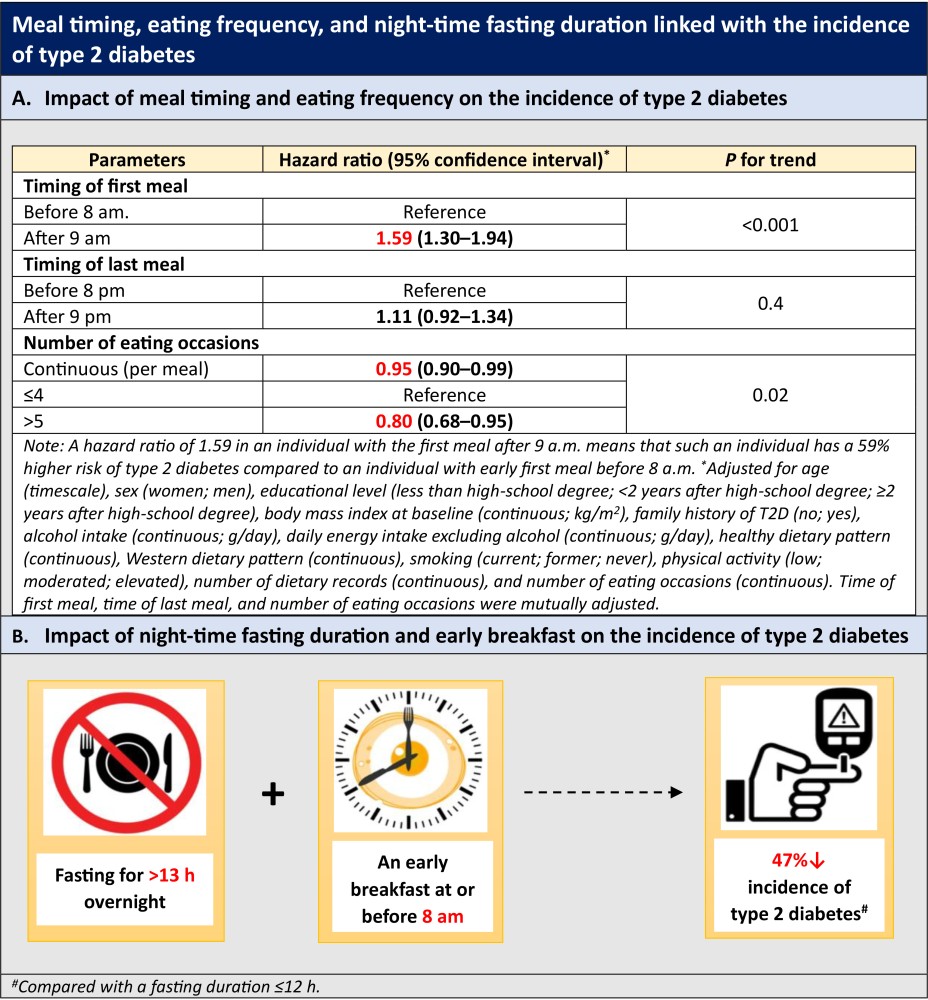
Meal timing plays a vital role in regulating circadian rhythms and glucose and lipid control.However, there is paucity of data investigating the relationship between meal timing and the incidence of type 2 diabetes (T2D).
A study by Palomar-Cros et al., published recently in the “International Journal of Epidemiology”, reported that eating meals early, i.e., first meal: Before 8 am; last meal: Before 7 pm, have beneficial effects in lowering the incidence of T2D. Eating a late breakfast was associated with a higher incidence of T2D, whereas increased number of eating episodes and prolonged fasting duration combined with an early breakfast were associated with a lower incidence of T2D.
This large prospective study included 1,03,312 participants (79% women; mean age at baseline: 42.7 years) completing minimum three 24-h dietary records during their first 2 years of follow-up period from the NutriNet-Santé study cohort (2009–2021). The median follow-up duration was 7.3 years. Repeated 24-h dietary records were used to assess meal timings and frequency of the participants, and they were averaged from the first 2 years of follow-up (5.7 records/participant). Night-time fasting duration was calculated as difference between the last and first eating episodes (assuming that daily eating behaviors remain constant). Multivariable Cox proportional hazard model (adjusted for known risk factors) was used to estimate the hazard ratios (HRs) and 95% confidence intervals (CIs) and to determine the associations of meal timing, number of eating episodes, and night-time fasting duration with incidence of T2D.
The primary results are summarized below:
- During the follow-up period, 963 participants developed new-onset T2D.
- Participants eating breakfast after 9 am had 59% higher risk of developing T2D compared to those eating breakfast before 8 am (Graphic A).
- Likewise, participants eating dinner after 9 pm had 11% higher risk of developing T2Dcompared to those eating dinner before 8 pm (Graphic A).
- There was a lower risk of developing T2D among participants eating on >5 occasions/day compared to those eating on ≤4 occasions/day. There was a lower incidence of T2D with each additional occasion of eating (Graphic A).
- Incidence of T2D was not usually linked with the night-time fasting duration, except in participants having breakfast at or before 8 am and fasting beyond 13 h overnight compared with a fasting duration ≤12 h (HR 0.47, 95% CI 0.27–0.82; p for trend = 0.3) (Graphic B).

Clinical implications
- The findings of this study shed light on the importance of adopting an early breakfast habit as a simple and effective strategy to reduce the incidence of T2D.
- The study highlights that not only the nutritional quality of the diet, but also the timing, i.e., when we eat, may help in lowering the incidence of T2D. If these results are confirmed in other large-scale studies, it can lead to promising lifestyle interventions to prevent T2D using chrononutrition (a field in science, studying interplay between timing of food intake, circadian rhythms, and health).
- This research can be utilized in public health initiatives by emphasizing the significance of promoting healthier eating patterns and their potential impact on long-term health outcomes.
(Source: Palomar-Cros A, Srour B, Andreeva VA, Fezeu LK, Bellicha A, Kesse-Guyot E, Hercberg S, Romaguera D, Kogevinas M, Touvier M. Associations of meal timing, number of eating occasions and night-time fasting duration with incidence of type 2 diabetes in the NutriNet-Santé cohort. Int J Epidemiol. 2023. Doi: 10.1093/ije/dyad081)
